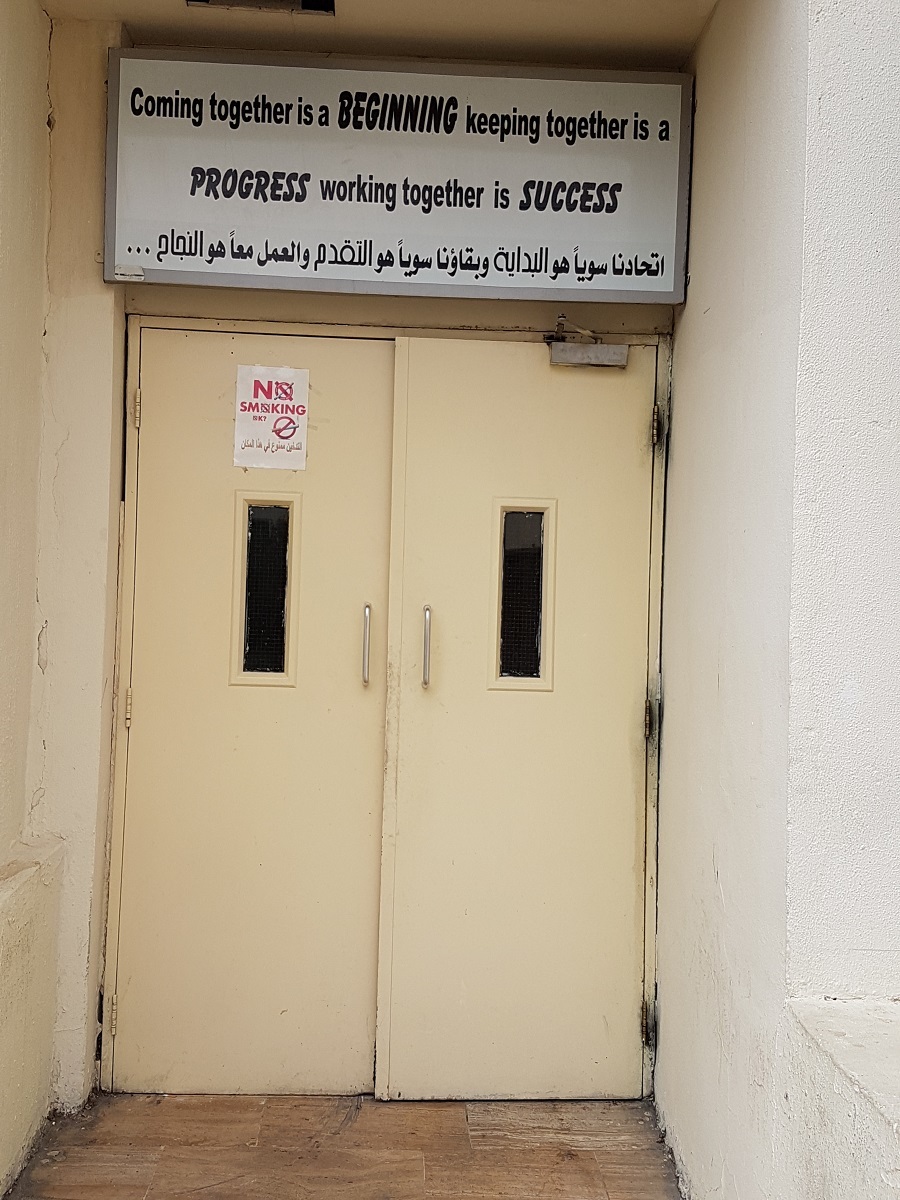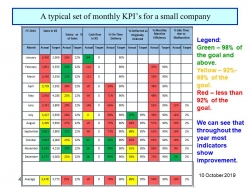Teamwork – How important is it and how do you create it?
A saying in both English and Arabic appears above the employee entrance to Mövenpick Hotel in Aqaba:
Coming together is a BEGINNING. Staying together is PROGRESS. Working together is SUCCESS.

A very good saying, even inspiring. It suits an international network that's centered in Europe.
We checked to find out whether it was just a slogan or if it was actually translated into action.
One employee interviewed said that she loved working there. People were nice and she enjoyed working with them. I showed this same employee a photo of the sign over the door and asked her if she recognized it. When she said yes, I asked if she and her fellow workers had discussed its content and how to implement it with their boss.
She replied men are always prioritized over the women. So, when the men needed help, there was teamwork. When it was women's work involved, they tended to forget they were on a team.
These were very honest words, painful and bold, and it was daring to come out like this against a culture of discrimination against women.
A sense of discrimination (in this case on a gender basis) converges with a sense of unfairness, and a sense of unfairness triggers negative emotions in our brains that are directed, in the end, towards our place of employment. Another employee said that she had never noticed the sign but added that she is short and doesn't look up much.
A third employee stated that she recognized the saying on the sign. Teamwork, she said, was very important in helping one fulfill one's tasks. Her boss discusses the contents of the sign with the team, but not all of the bosses do so.
As part of this summary I will present how I would operate if I had a saying as inspiring as this:
Empty sayings
Sayings have a lot of power when you actually put your money where your mouth is. If you don't implement your sayings, if you don't memorize them and discuss their meanings, it would be better not to publish them at all.
Sayings that are displayed all around the company but which are never referenced or discussed not only lose their meanings but also create a negative feeling with every attempt to draw employees towards a higher vision.
How important is it for us to build a team?
The question isn't whether teamwork is important, but rather how important it is to you, i.e. how willing would you be to invest (particularly money and time) in order to build and consolidate a work team? How much money is it worth to you?
I'll list a few of the advantages of teamwork here. You can do the financial calculations as to how worthwhile it is yourselves. The calculation is very subjective.
- The team pays attention to details. In other words, a consolidated team empowers its members and helps them, particularly in moments of weakness.
- A consolidated team strengthens company loyalty and the feeling of family or home.
- As we are basically social creatures, the sense of belonging to a group empowers us (I refer you to things the employee said on the absence of teamwork and to my article on fairness).
- Fairness. When we are required to fulfill less pleasant tasks, the knowledge that the whole team is taking part will encourage us and make fulfilling the task easier.
How do you consolidate a team?
- Names. When employees do not know each other's names, they may address each other as "hey, you". This generates alienation, which creates detachment between the employee and the company. I have met employees who have worked together for many years, and don't know each other by name. At first, the employee is new, and later, they are embarrassed to ask his name. If this is the case, the most basic tool to use for team consolidation is recognition of employees by their names. The solution is also simple: name tags on employee work clothes. Simple, inexpensive, and yet, not very widespread.
- Regular work teams. If at all possible, it is important to maintain regular work teams.
- Manager's responsibility. It is essential that you, as manager, take responsibility for employees on the team, that you be attentive to their feelings and what they say. Call employees when they are sick and be the person they come to with any questions or requests. At one company, not long ago, we set up three managers to be "housekeepers" to the employee teams. These positions would instill the values of home at work: work according to rules and regulations, demand order and discipline, and at the same time, care for their welfare, be the one they came to with their troubles, as if they were their children.
- Shared objectives. Shared objectives and shared thinking (in improvement teams, for instance), consolidate a team. When there are shared objectives and cooperation is needed among employees in different positions (for example, production and maintenance staff, or sales and production) or different shifts, barriers are broken, generating familiarity and consolidation.
- Information. Nobody likes uncertainty. When we don't have a way to obtain information and to resolve our uncertainty, we go on the defensive, which is usually expressed in detachment under the guise of not caring. Therefore, a manager who wishes to motivate her employees will make sure she provides them with information. The best idea would be to gather the team together at the beginning of the shift or once a week, and to provide a review of what has been and what is planned. The employees' sense of ease will make team consolidation easier.
- Competition. Competition between individuals or among teams or shifts is one of the first paths a lot of managers take. But competition is a short-sighted tool. It works against consolidation and sometimes, along with the efforts to succeed, we encounter efforts to make others fail (e.g. another shift).
- Consolidation activities. At the high end of the scale of means is consolidation activities. These are guided activities, outside the office (eg. ODT: Out Door Training), requiring teamwork to overcome complex tasks. Going to the beach or entertainment with backgammon and beer is very nice, but usually, employees will sit in familiar groups and won't make an effort to get to know other employees.
Summary and Recommendations
Mövenpick put up a great saying:
Getting together is a BEGINNING. Staying together is PROGRESS. Working together is SUCCESS.
If I were CEO of that company, I would hold several meetings with the managers to discuss the meaning of the saying, and ask them to suggest ways to implement this meaning - how to continue working together and how to attain success through the team.
I assume that at a company like this, there are more than a few managers as one rises through the hierarchy, so I would begin with the most senior managers and ask them to establish a similar process with their sub-managers, and so on, to the final level of each team manager with the team employees he leads.
Most methods for team consolidation contribute a great deal at negligible costs. For example, name tags on work clothes, regular teams, shared objectives instead of competition between teams, and so on. It all begins by defining the management objective.
Even consolidation activities like ODT, which cost money, will contribute ten times their worth in costs.
I recommend nurturing and consolidating your work teams. This will strengthen the company's relative advantage – its employees.












 My First Book: Manage! Best Value Practices for Effective Management
My First Book: Manage! Best Value Practices for Effective Management